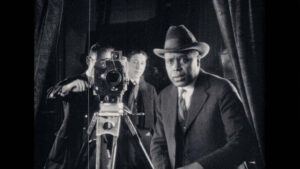
By Maggie Hardy
Oscar Micheaux was a leader, his art blazed trails and his self-sufficiency and DIY nature has paved the way for countless independent creators. Like many pioneers, however, his true impact wasn’t realized until decades after his passing. He was born on January 2, 1884 in Metropolis, Illinois to a former slave. Micheaux was a jack of all trades, his work spanned from writer to steelworker to Pullman porter. After seeing most of America via the rails and building up some decent savings he became a homesteader in South Dakota and began to write articles and books about his experience farming. Some of his early articles were published in the Chicago Defender (which at that time was the most circulated Black-owned newspaper in the country) and in 1918 his semi-autobiographical novel The Homesteader caught the eye of George Johnson.
Actor Noble Johnson (King Kong) and George Johnson founded the Lincoln Motion Picture Company in 1916, it was the first Black owned film production company and focused exclusively on race films. While Lincoln only lasted five years and made a scant five pictures, it was George Johnson’s interest in Micheaux that pushed him into film. Lincoln never managed to produce The Homesteader, so Micheaux decided to start his own company, the Micheaux Film Corporation, and make the film himself.
Micheaux quickly became a director, writer, and producer of renown. His projects were numerous, in 1922 alone he made four films and between 1920 and 1934 he made an average of 2.3 films a year! He worked in multiple genres and even did a few horror films, though no examples of this work exist today.
If anything Micheaux was a passionate and somewhat blunt filmmaker. Almost all of his pictures dealt with the bigger picture issues of Blackness in America and he focused on particular themes like “passing”, interracial relationships, and the social standing of mixed peoples.
Lost Films, Lost Histories
One of the most tragic aspects of early cinema is the staggering number of films which have been totally lost. While some lost films can be traced to specific events like the 1937 Fox vault fire where more than 40,000 reels went up in flames, the loss of race films in part due to their perceived lack of value and niche distribution is tantamount to the suppression of marginalized voices. Of Micheax’s forty-two directorial credits a scant ten of them appear to be available in any sort of form today and of those only six are readily watchable (you can however read almost all of his novels). This tragedy is further compounded because the ‘20s and ‘30s had some of the highest representation that Black filmmakers would see for decades in the USA. There’s almost a 50 year gap between some of the first feature films directed by Black women and Kathleen Collins’ Losing Ground in 1982. From Losing Ground it would be another 10 years before Julie Dash’s Daughters of the Dust would be the first commercially distributed narrative feature created by a Black woman. Black history is the history of American film and the seeds that were sown by Black pioneers like Micheaux a hundred years ago are still growing proud and strong today.
Body and Soul
A stunning debut from civil rights activist and singer Paul Robeson. Body and Soul tells the story of a prisoner who disguises himself as a Reverend in a small town. High melodrama ensues, featuring enough lies, loves, and evil identical twins to make most modern soaps blush. Selected by the Library of Congress for inclusion in the National Film Registry in 2019.
Swing!
In this Harlem Renaissance talkie a love triangle gone wrong sees Eloise Jackson (Hazel Diaz) leave Alabama for the excitement of Harlem. A great showbiz drama. Starring famed vaudeville singer Cora Green and features a cavalcade of talent, from song and dance to some fabulous trumpet courtesy of Dolly Jones (the first female trumpet player to record a jazz album).

